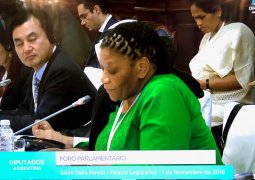
Note to the Editor: STATEMENT updated with Ms Thandi Modise's clip. Follow the link to download:
https://wetransfer.com/downloads/ea168f50bd9801306814877ecad9484f20181101203124/2b4eba7be5e72fd2000bfa51f3ed7ebb20181101203124/26cf6c
Parliament, Thursday 1 November 2018 – Enforcing anti-corruption laws was essential but not enough, on its own, to combat corruption. It also needed commitment from all stakeholders in society to entrench integrity and to scrutinise if government action was prioritising the interests of the people.
This was a message from National Council of Provinces Chairperson Ms Thandi Modise at the Speakers’ Summit of G20 Parliaments in Buenos Aires, Argentina, today.
The Inter-Parliamentary Union and National Congress of Argentina organised the Speakers’ Summit and Parliamentary Forum, which preceded it. These events aim to provide an opportunity for parliamentarians to interact on issues on the agenda of the forthcoming G20 Leaders’ Summit, progress on them and how Parliaments of G20 countries could support implementation of decisions taken.
The NCOP Chairperson told the Speakers’ Summit that while corruption was often elusive to define, it was incredibly easy to recognize.
“It destroys public trust and the moral fabric of society. It weakens state institutions and hinders development. It can lead to damaged or loss of territorial sovereignty because of its negative impact on national security. By undermining trust and delegitimising institutions, corruption makes it hard to take collective decisions needed to advance the common good,” Ms Modise said
A number of international, continental and domestic measures aimed at curbing corruption. The United Nations 2030 Agenda for Sustainable Development, under Goal 16, called on countries to promote and develop inclusive and sustainable institutions by reducing bribery and corruption. The African Union (AU) Agenda 2063 recognised that corruption eroded development of a universal culture of good governance – a pre-requisite for a prosperous and peaceful Africa.
South Africa had a strong laws, policies and institutions to combat corruption but these were inadequately enforced sometimes. Over the past months, however, there had been a series of parliamentary inquiries on public and private institutions and judicial commissions of inquiry into alleged corruption, state capture and other forms of abuse of office. “South Africa is taking corruption on and I know we shall win this battle,” Ms Modise said.
She added: “As parliamentarians we must be relentless in committing to transparency and accountability. Integrity is a culture and a weapon we must entrench within our societies. Civil society and the media must continue to play the watch-dog role to subject government to greater scrutiny.”
Earlier, the NCOP Chairperson facilitated a panel discussion on the topic: The Future of Work. Mr Daniel Funes de Rioja, Argentina’s Chair of the B20 and 2018 G20 Leaders’ Summit, Ms. Ankie Broekers-Knol, Speaker of the Senate of the Netherlands and Ms. Shobha Karandalaje House of Representatives of India were panel participants.
On Friday, the last day of the series of engagement by Heads of Parliaments of G20 nations, delegates will discuss the role of Parliament in the G20 architecture before adopting the resolutions of the G20 Parliaments to influence the discussions at the upcoming G20 Leaders Summit, scheduled later this month also in Buenos Aires, Argentina.
ISSUED BY THE PARLIAMENT OF THE REPUBLIC OF SOUTH AFRICA
Enquiries: Moloto Mothapo 082 370 6930

